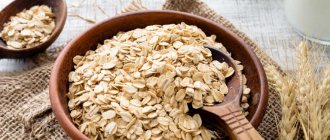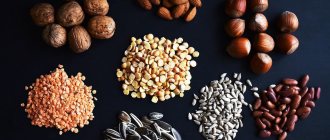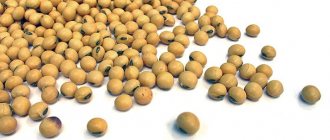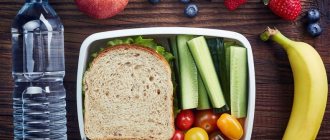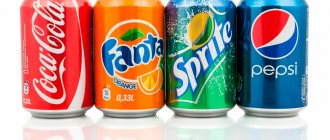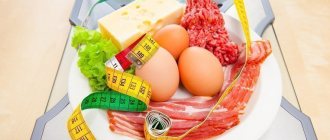Carbohydrate foods aren't just bread, pasta, and potatoes. A significant amount of carbohydrates is found in fruits, vegetables and even nuts. Moreover, some of these contain healthy fiber, others contain sugar and fructose, which are harmful to metabolism.
In chemical terms, carbohydrates are molecules made up of carbon, hydrogen and oxygen atoms. In nature, carbohydrates are synthesized by green plants from carbon dioxide and water during photosynthesis - in fact, they are formed when the plant grows under the influence of sunlight.
Table of carbohydrate content in food
| Name | Amount of element per 100 grams of product |
| Legumes | 2-63 gr |
| Cereals and grains | 3-73 gr |
| Fruits and dried fruits | 5-88 g |
| Vegetables | 5-80 gr |
| Milk products | 2-54.5 g |
| Fish and seafood | 1.5-11.5 g |
| Meat | 0.1-5 g |
You don't need to know everything about carbohydrates to get the most out of an element.
It is enough to understand the individual characteristics of your body, be aware of its needs, navigate the composition of food products and eat a balanced diet.
Rules for losing weight
Foods rich in fiber are slowly absorbed by the body, therefore, from the point of view of nutritionists, they are the most useful for losing weight. The most correct thing would be to eat vegetables, herbs, legumes and dishes from various cereals.
- If you wish, you can add nuts to the menu; eating sunflower seeds, white cabbage and sour apples has a good effect.
- The body's need for pectin can be fully met by apricots, cranberries and fresh cucumbers; it is quite acceptable to consume pasta, buckwheat and rice.
- Nutrition during the diet should be complete and properly balanced.
In addition, you should definitely take into account physical activity so as not to feel lethargic and not overeat.
The role of carbohydrates in the body
Macro and micronutrients are important for humans, as they regulate basic processes. There are several functions that carbohydrates perform in the body:
- During the process of breaking down an element, the time and level of energy used by the body increases several times. Thus, more calories are burned.
- Regulate blood glucose levels.
- They increase the supply of glycogen deposits, which the body needs as a source of strength.
- Relieves the body of hunger.
- Nourishes the brain and cells with essential elements.
- They help the intestines function due to their antiseptic and cleansing properties.
Carbohydrates include most types of cereals, grains, fruits, berries, vegetables and grains. The oligosaccharides they contain directly affect the intestines, improving its microflora and overall tone.
It is important to remember that eating a lot of carbohydrates is unhealthy. In this case, a person may encounter the following problems:
- excessive weight gain;
- load on the liver;
- diseases of internal organs;
- problems with the gastrointestinal tract;
- intestinal obstruction and constipation.
Complex and slow
These polyfunctional compounds have several chains of monosaccharide molecules in their structure. These include:
- Starch
- there is a lot of it in whole grain bread, various cereals, rice, potatoes, and legumes. There are 4 types of this complex carbohydrate found in nature. The first can be found in beans, peas, lentils, and chickpeas. It is distinguished by its resistance to digestion and its connection with fiber. The second type is found in potatoes and corn that have not undergone heat treatment, and in bananas and greens. The third is found in the same potatoes, boiled or fried, and in rice. The fourth is the brainchild of chemical processing. It is not found in natural food. Particularly useful is resistant starch, which is a breeding ground for bacteria that help our intestines work properly and smoothly. The main task of a modern person who wants to improve their health is to learn to distinguish a resistant substance from a regular one, which is rich in food stuffed with refined carbohydrates.
- Fiber
is valuable coarse fiber that is found in fruits, vegetables, cereals, nuts, and beans. They carefully cleanse the intestines, remove waste and toxins, help reduce cholesterol levels in the blood, and also slow down the absorption of glucose. We know that eating fiber in your diet is the key to keeping you full for longer. And if we are full, we will not need high-calorie and sugary snacks that lead to weight gain.
- Glycogen
is glucose molecules assembled into a single chain, an excess of monosaccharide that enters the blood. They are deposited in the liver and muscle tissue. If you play sports, you know that a lack of glycogen leads to feelings of fatigue, weakness, and physical exhaustion. That is why, before a long workout, you need to eat something light, but filling and healthy - for example, a medium-ripe banana, a salad of berries and fruits.
Since realizing the importance of multifunctional compounds, we have been concerned with the question of which foods contain carbohydrates. Increased interest is associated with conversations about the dangers of mono- and disaccharides. Are they really that dangerous and why are they called the enemies of a slim figure? Let's look into this further.
Types of carbohydrates
Carbohydrate foods are extremely beneficial for the human body. Carbohydrates are divided into three groups:
- fast;
- slow;
- poorly digestible.
Each of them performs specific functions. The first is responsible for the “building material” for the muscles and cells of the body, turning into nutritional elements. The second task is “healthy carbohydrates”. Poorly digestible carbohydrates include fibrous and fiber-containing foods. Its function is to cleanse the stomach by passing through it in “transit”.
Carbohydrates are of the following types:
- fructose;
- sucrose;
- glucose;
- lactose;
- galactose;
- starch;
- cellulose;
- maltose.
When losing weight, it is recommended to eat carbohydrates from the category of “complex” and “poorly digestible”, as they contribute to a long feeling of fullness and even help to spend more calories during digestion. The group of “simple” carbohydrates should be abandoned during diets, because they have virtually no effect on the disappearance of hunger, but contribute to weight gain. In order to competently and effectively lose weight, it is recommended to create a balanced diet with a carbohydrate content of approximately 20%, taking into account the number of calories in the dishes.
Simple carbohydrates
This category includes subtypes of the element responsible for feeding the brain, increasing blood sugar and a number of other functions. They are found in foods such as fruits, maple syrup, berries, fruits, cane, and beets. Simple carbohydrates are divided into several subtypes:
- Glucose. It is considered the optimal and most active source of energy in the human body. Found predominantly in human blood. It is a kind of obligatory “passing point” in the breakdown of elements from food, since it is after its work that they are absorbed by the body.
- Sucrose. It has the ability to dissolve easily and quickly, so the body uses it as an energy reserve. It contains fructose and glucose, which break down in the stomach.
- Lactose. Among its sources are dairy products. Its task is to break down milk enzymes that enter the stomach along with food. A common disease called lactose intolerance occurs in people who lack this enzyme in their bodies.
- Fructose. The body needs the enzyme in relatively small quantities because fructose has a high level of sweetness. Found mainly in fruits. It is considered a “safe” carbohydrate that can be consumed by people with diabetes. Easily converted to fat.
- Galactose. Responsible for the conversion to glucose, the process occurs in the human liver. Contained in the brain and nerve tissues. The human body is partially capable of synthesizing it independently.
- Maltose. The second name is “malt sugar”. It is easily accepted by the body, since the composition of gastric juice contains enzymes similar in composition to maltose. It is a source of strength for the brain and body.
Complex carbohydrates
This type of element is called “carbohydrates for weight loss”, since they not only perform important functions, but also have a positive effect on metabolic processes, the number of calories burned and energy reserves. Dishes made from them can deprive a person of hunger for a long time and relieve weakness, and the elements that are in them cleanse the intestines, eliminating toxins.
Types of complex carbohydrates include:
- Cellulose. Due to its fibrous structure, it is not absorbed in the human gastrointestinal tract, passing through it. It swells in the stomach and increases several times in size, due to which it provides a long-lasting feeling of fullness. Eliminates excess bacteria and toxins.
- Starch. It has the ability to turn into glucose, providing a person with a boost of energy and strength. Due to its slow breakdown, it relieves hunger. The remains of undigested starch are found in the liver in the form of glycogen.
- Maltodextrin. It is often used as a component of sports nutrition, as the element can influence vigor and productivity. It does not exist in nature, it is obtained in the laboratory using the chemical breakdown of starch.
The enzymes that make up complex carbohydrates provide the body with additional calories and strength, which makes their use indispensable during weight loss. You cannot eat simple carbohydrates when losing weight; it is advisable to limit their amount to a minimum.
Losing weight with carbohydrates
Grains and legumes are the main suppliers of carbohydrates, in addition they are high in plant protein and minerals. Unprocessed grains are of the greatest value; the bulk of the beneficial substances are contained in the germ and shell of the grain.
Legumes have a decent protein content, but all of it is not absorbed by the body. In some cases, their abuse can lead to intestinal dysfunction.
Millet and pearl barley contain large amounts of fiber, buckwheat contains iron, and oatmeal contains potassium, magnesium and zinc.
- There is an opinion that the introduction of foods containing carbohydrates into the diet contributes to obesity.
- The opinion is erroneous, if only because carbohydrates are absorbed much faster than proteins and fats, being processed into energy.
- It’s just not advisable to eat foods rich in carbohydrates in the afternoon. And it is worth maintaining normal activity.
Daily carbohydrate needs
Adherents of proper nutrition are advised to know the daily carbohydrate intake in order to correctly calculate their diet. Nutritionists advise using the formula: 5 grams of the element per 1 kilogram of your weight for a sedentary lifestyle or weight loss, or 8 grams per 1 kilogram of your weight for an active lifestyle.
To calculate your individual micronutrient requirements, you should know several rules:
- if you exercise regularly, the most carbohydrates should be consumed within 2-3 hours after completion of training, during the opening of the “carbohydrate window”;
- people who are not keen on sports should divide the intake of the element evenly throughout the day;
- Do not get carried away with foods containing excessive amounts of carbohydrates, as their excess can be fraught with problems with the gastrointestinal tract.
The daily norm of any element is calculated individually, based on the characteristics of the person:
- height and weight parameters;
- age;
- health indicators;
- test results;
- speed of metabolic processes;
- individual characteristics.
Table of average carbohydrate consumption per day
| Daily physical activity level | Age | For women, g | For men, g |
| Short | 18-30 | 323 | 330 |
| 30-45 | 310 | 320 | |
| 45-60 | 295 | 305 | |
| Moderate | 18-30 | 350 | 365 |
| 30-45 | 335 | 340 | |
| 45-60 | 320 | 330 | |
| Average | 18-30 | 370 | 385 |
| 30-45 | 360 | 375 | |
| 45-60 | 340 | 350 | |
| High | 18-30 | 440 | 455 |
| 30-45 | 420 | 430 | |
| 45-60 | 400 | 405 | |
| Sports | 18-30 | 450 | 450 |
| 30-45 | 435 | 440 | |
| 45-60 | 430 | 435 |
Helpful information
Almost all vegetables need to be stored in the refrigerator. The exception is unripe vegetables, because at room temperature they will become a little riper. Also, shelf-stable foods, such as potatoes and beets, are not required to be stored in the refrigerator, but it is advisable. The most convenient place in the refrigerator for vegetables is the bottom drawer. Many of them can be safely stored there for up to 1 month. But most vegetables are best used within a week. If you freeze or buy frozen vegetables, then rest assured, because... they remain tasty and healthy for a very long time - up to one year. Canned vegetables should be stored in a cool, dark place, the optimal temperature should be below 15 degrees.
List of carbohydrate foods
For the full functioning of all internal organs and maintaining health, you should approach the choice of food responsibly. The food you eat should contain sources of carbohydrates to provide your body with micronutrients, vitamins and minerals. You should not get carried away with low-carb systems for more than a month - this is fraught with health problems. High-quality and healthy nutrition should be balanced and include all nutrients.
Main sources of simple carbohydrates in food:
- sugar;
- honey;
- carbonated drinks;
- flour products;
- sweet fruits.
As a rule, the highest concentration of simple carbohydrates contains a product with a large amount of sugar in its composition. A nutrient can only be useful if consumed wisely. An element included in the “simple” group has a high GI (glycemic index). The body digests it quickly and does not receive sufficient saturation.
Eating foods from this group in large quantities leads to excess weight and increased blood sugar. Foods high in complex carbohydrates:
- bread;
- wild rice;
- whole grain products;
- cereals and cereals.
Products with such carbohydrates can only provide benefits to the body. They satisfy the appetite, eliminate toxins and have a positive effect on blood sugar, brain function, gastrointestinal tract and other organs. It is recommended to consume carbohydrate-containing foods to lose weight and stay in shape.
Content of simple carbohydrates in products
The category of simple carbohydrates includes flour and sweet foods, as well as fruits, berries and honey. It is recommended to exclude them from the diet during the process of losing weight. When consumed in large quantities, health problems may arise:
- bloating;
- sleep problems;
- headache;
- diarrhea;
- vomit;
- liver problems;
- risk of diabetes.
To avoid such ailments, it is recommended to consume foods rich in carbohydrates in moderation and not forget about other microelements. It is advisable to completely exclude from your diet only simple carbohydrates with a high sugar content, such as candies, pastries, and cookies. They are considered harmful to both figure and health, as they excessively increase blood glucose levels. Food products with such carbohydrates should be consumed in limited quantities and in the first half of the day.
Table of simple carbohydrate content in food
| List of products | Amount of element per 100 grams of product |
| Fresh fruits | 50-82 |
| Berries | 10-79 |
| Dried fruits | 65-90 |
| Milk chocolate | 65-83 |
| Honey | 82 |
| Cookie | 50-73 |
| Jam | 70-80 |
| Table sugar | 100 |
| Sweet flour products | 56-89 |
| Candies | 90 |
| Fried potatoes | 29 |
Content of complex carbohydrates in products
Carbohydrates are foods that can affect human health both positively and negatively. Complex carbohydrates have many benefits:
- improve brain function;
- increase concentration;
- deprives you of the feeling of hunger;
- cleanse the intestines of toxins and bacteria;
- help in losing excess weight.
It is recommended to include them in your diet. Foods rich in nutrients help improve digestion, speed up metabolism and prevent certain diseases.
Complex carbohydrates are mainly cereals and grains. Plant foods are rich in nutrients, vitamins and minerals. To maintain health all year round, it is recommended to include in your diet foods that contain complex carbohydrates along with vitamins.
Table of complex carbohydrates in food
| Name | Element content per 100 grams |
| Buckwheat | 56 |
| Barley porridge | 73 |
| Bulgur | 19 |
| Cereals | 55-86 |
| Rice | 31 |
| Wholemeal bread | 53 |
| Peas | 56 |
| Beans | 54 |
| Vegetables | 18-83 |
| Lentils | 53 |
| Teff | 20 |
Daily volume
Many people go on a protein diet exclusively to accelerate weight loss. This is fraught with various kinds of troubles, including disruption of the central nervous system, liver, and kidneys. The risk of cardiovascular diseases increases.
To avoid this, you simply need to include foods containing carbohydrates in reasonable quantities in your diet, and calculating the amount required for a particular person is not difficult - one gram of carbohydrates in foods contains approximately 4 kilocalories.
What are the dangers of excess and lack of carbohydrates?
Carbohydrate foods, together with fats and proteins, form the basis of nutrition. They consist of oxygen, hydrogen and carbon - substances vital for humans. The amount of carbohydrates you eat daily directly affects your well-being and health. The following symptoms may indicate that you are not eating enough carbohydrates:
- hand tremors;
- feeling of weakness in the body;
- regular dizziness;
- fainting;
- nausea;
- prolonged headaches;
- sudden weight loss;
- sweating;
- permanent feeling of hunger;
- drowsiness.
The benefit of carbohydrates is that they regulate blood glucose levels, prevent excess weight gain and provide the body with the necessary energy. However, excessive consumption of this element can cause harm in the form of the following symptoms:
- increased blood sugar;
- problems with the gastrointestinal tract;
- increase in body fat;
- problems with the cardiovascular system.
By eating the right carbohydrates in moderation, you will minimize the risk of these problems. To stay healthy, try to choose food sources that contain vitamins and minerals in addition to carbohydrates.
What carbohydrates should you eliminate from your diet to lose weight?
Those who monitor their weight and try to balance their diet, want to maintain health at the desired level, need to know what carbohydrates contain. Only by having a list of products can you prevent a lack of this component in your diet.
To lose weight, you should limit as much as possible the consumption of fast carbohydrates, which are found in various flour products made from wheat flour, sweets, sweet carbonated drinks and packaged juices.
Balanced diet
A well-designed diet is suitable as a diet for weight loss, nutrition before and after workouts, and a daily healthy habit. To ensure that your diet benefits your body, follow several important rules:
- Be careful when consuming microelements. Try not to exceed the limits recommended by your doctor.
- Drink the optimal amount of clean still water daily (1.5-2 liters for an adult).
- Eliminate low-quality foods from your diet, as well as foods with a lot of sugar, canned food, soda, fast food and snacks.
- The optimal dietary regimen is considered to be a fractional nutrition system, when meals are divided into 5-6 times and accompanied by small portions.
- Develop good habits. This could be regular exercise, long sleep or morning exercises. They increase the concentration of the hormone serotonin, which has a positive effect on health.
Thanks to vitamins and minerals, the human body is able to function fully. If you feel that you are lacking micronutrients in the food you eat, you can get them through dietary supplements, which come in a variety of forms and flavors. Before changing your diet, it is recommended to visit a doctor and get tested.




